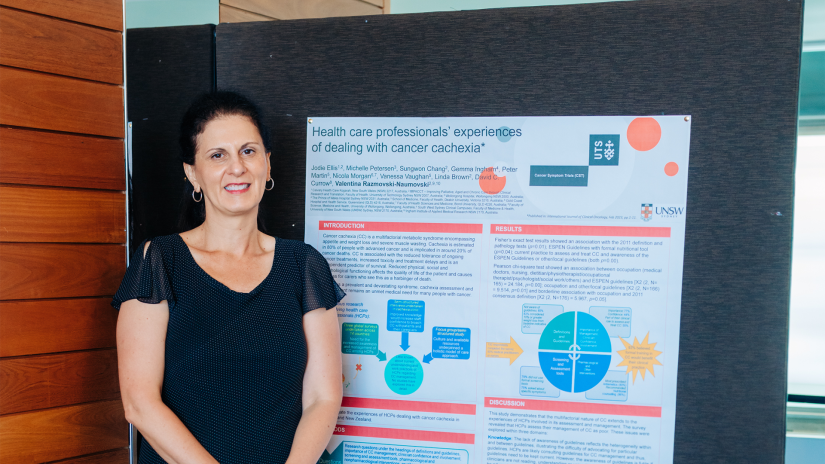Cachexia assessment and management remain an unmet medical need for many people with cancer. Study finds that a simplified, systematic approach incorporating screening, assessment and evidence-based management is recommended for ongoing patient care.

Dr Tina Naumovski, along with the PaCCSC/CST Appetite and Cachexia Symptom Node Subcommittee, explores how Australia and New Zealand health care professionals deal with cancer cachexia.
Cachexia
Cachexia is a devastating syndrome encompassing appetite and weight loss and severe muscle wasting. It is estimated in 80% of people with advanced cancer and is implicated in around 20% of cancer deaths. Reduced physical, social and psychological functioning affects the quality of life of the patient and causes distress for carers.
While it is a prevalent syndrome, cachexia assessment and management remain an unmet medical need for many people with cancer. Previous global surveys undertaken across 14 countries investigated goals of treatment practices and highlighted the need for increasing awareness and the management of cancer cachexia among health care professionals.
The study
The Appetite and Cachexia Symptom node subcommittee, supported by PaCCSC/CST, surveyed 192 Australian and New Zealand health care professionals’ and their experiences of dealing with cancer cachexia.
The published paper summarised the results into three main themes: knowledge, clinical practice and clinical management in cancer cachexia. In terms of knowledge, more than 80% incorrectly reported weight loss, and wanted a better understanding of the physiological processes and current cancer cachexia guidelines. Over 90% indicated that formal training or education in cachexia would benefit their clinical practice.
In clinical practice, just over half of the respondents discussed assessment, treatment and monitoring of cancer cachexia—55% of the respondent’s subset assessed and treated cancer cachexia in their practice and allied health personnel were involved “as needed”. Seventy-five percent of a subset screened for specific symptoms related to cancer cachexia, with 75% reassessing the symptoms at each review. Formal screening and assessment tools were infrequently used.
In terms of clinical management, carers were more likely to initiate the discussion of cancer cachexia. Antinausea, prokinetic agents (drugs that enable food to move through the gastric system) and steroids were the most prescribed medications, with megestrol acetate less popular (used for loss of appetite). Clinical management is made more difficult because there is no registered medication to manage cancer cachexia (except in Japan). Thus, there was an emphasis on nonpharmaceutical interventions—psychological support, nutrition counselling, exercise and mouth care.
Conclusion
Our study supports previous studies and underlines the need for health care professional training and national support for the systematic assessment and management of cancer cachexia. Although access to a multidisciplinary team is ideal, a simplified, systematic approach incorporating screening, assessment and evidence-based management is recommended for ongoing patient care.
Research is urgently required to examine whether earlier diagnosis and intervention(s) for cancer cachexia have positive impacts during cancer treatment and survival.
Reference
Ellis J, Petersen M, Chang S, Ingham G, Martin P, Morgan N, Vaughan V, Brown l, Currow DC, Razmovski-Naumovski V (2023) Health care professionals’ experiences of dealing with cancer cachexia. International Journal of Clinical Oncology https://doi.org/10.1007/s10147-023-02300-6.

Dr Tina Naumovski is a Senior Research Fellow at South West Sydney Clinical campuses, Faculty of Medicine and Health, the University of New South Wales Sydney, Australia. Tina is a researcher with a multidisciplinary approach spanning the cultivation, analytical, pharmacological/preclinical, and clinical and qualitative research of bioactive compounds.

